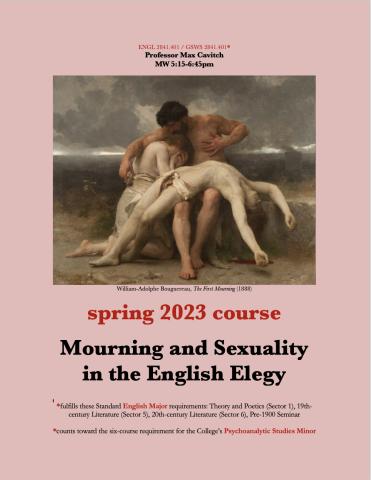Mourning and Sexuality in the English Elegy
In this advanced seminar on poetic history, genre, and form, we’ll explore a major poetic genre—the elegy—in relation to its two, intertwined themes: death and sex. From antiquity to the present, poets have written elegies to express their diverse experiences of the mingling of love and loss. Erotic attachments of all kinds—romantic love, filial love, matrimonial love, platonic love, unrequited desire, frenzied lust, self-love, friendship, interspecies love, etc.—are always linked, in one way or another, to our awareness of loss and mortality. “Let love clasp grief,” Alfred Tennyson implores in his great elegy, In Memoriam, “lest both be drowned.” We’ll explore the connections between Eros and Thanatos in a wide variety of English-language elegies from the Renaissance to the present—with an emphasis on the 19th, 20th, and 21st centuries. Our authors will include John Milton, Andrew Marvell, John Donne, Alexander Pope, Percy Bysshe Shelley, Christina Rossetti, Emily Dickinson, Hart Crane, Langston Hughes, W. H. Auden, Elizabeth Bishop, Allen Ginsberg, Michael Harper, Adrienne Rich, Audre Lorde, Stuart Hemphill, Thom Gunn, Marilyn Hacker, Rigoberto González, Mary Jo Bang, and Elizabeth Alexander. All of the elegies we’ll read raise challenging questions about desire, identification, reproduction, gender, and sexuality. Elegy’s traditional male-centeredness will encourage us to pay special attention not only to the work of female poets but also to the male homoerotics of elegy. And we’ll consider the erotics of form and the gendering of poetic language. We’ll also encounter some extreme conjunctions of mourning and sexuality, such as Sylvia Plath’s sadomasochism and Edgar Allan Poe’s necrophilia. To help enrich and extend our discussion of the poems, we’ll read some accounts of mourning and sexuality from the fields of psychoanalysis, anthropology, sociology, philosophy, and literary criticism, by authors such as W. E. B. Du Bois, Sigmund Freud, Julia Kristeva, Peter Sacks, Vicki Hearne, Douglas Crimp, Zygmunt Bauman, Lauren Berlant, Dagmawi Woubshet, David Eng, and Judith Butler. Course requirements include: attendance and active participation at all class meetings; occasional pop quizzes; short memorization, recitation, and imitation exercises; an annotated bibliography; and a research-based critical essay. (There will be no midterm or final exam.) This course is related to the PSYS minor.

 Department of English
Department of English
